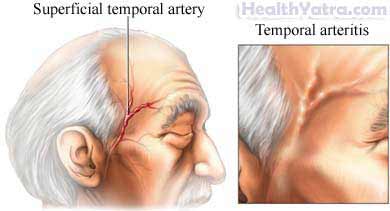Definition
Temporal arteritis is a condition of inflammation of the arteries. It affects the head, neck, upper body, and arms. The temporal artery is most often affected. It runs over the temple, to the outside of the eye. In extreme or untreated cases, this condition can lead to blindness or strokes. Two other terms often associated with this condition include:
- Giant cell arteritis (GCA)—another name for temporal arteritis
- Vasculitis—a general term for swelling or inflammation of blood vessels

Causes
The cause of temporal arteritis is not known. It may result from an immune response in the body.
Risk Factors
Factors that increase your risk of temporal arteritis include:
- Age: 50 or older
- Race: White, especially of Scandinavian or northern European descent
- Location: northern latitudes
- Sex: female
- Family member with temporal arteritis
- Polymyalgia rheumatica, a condition characterized by stiffness and pain in muscles of the neck, shoulders, lower back, hips, and thighs
- Smoking and low body weight
Symptoms
Symptoms may include:
- Headaches that are usually localized and one-sided
- Fever or flu -like symptoms
- Pain when chewing
- Pain in the jaw or tongue
- Scalp pain or tenderness over the temporal artery
- Anemia
- Fatigue
- Loss of appetite and weight loss
- Vision loss
- Sweats
- Aches in the joints or muscles
Diagnosis
The doctor will ask about your symptoms and medical history. A physical exam will be done.
Diagnosis is based on the occurrence of certain factors, including:
- Age: 50 or older
- New localized headache
- Temporal artery tenderness or decreased temporal artery pulse
- Sedimentation rate of 50 mm/hour or greater
- Abnormal temporal artery biopsy
- Anemia
Tests may include:
- Blood tests, including a sedimentation rate, c-reactive protein, hemoglobin, or hematocrit
- Biopsy —removal of a sample of the temporal artery for testing
- Retinal exam
- Ultrasound of the temporal artery
Treatment
Treatment may include:
Corticosteroid Therapy
This therapy is used to decrease the swelling and inflammation. It will also help decrease the risk of blindness. At first, high doses of prednisone are often given. The doses are then tapered off. Therapy is often continued for several years.
Long-term use of corticosteroids has some harmful side effects. This may include:
- Osteoporosis —weakening of bones
- Diabetes —high glucose levels in blood
- Cataracts —clouding of the eye’s lens
- Stomach irritation
Supplements will help to stop these effects on the bone. The supplements may include:
- Calcium
- Vitamin D
- Bisphosphonate
Low-Dose Aspirin
Your doctor may recommend that you take low-dose aspirin every day. This may help to reduce the risk of vision loss associated with temporal arteritis.
Prevention
There is no known way to prevent temporal arteritis.
